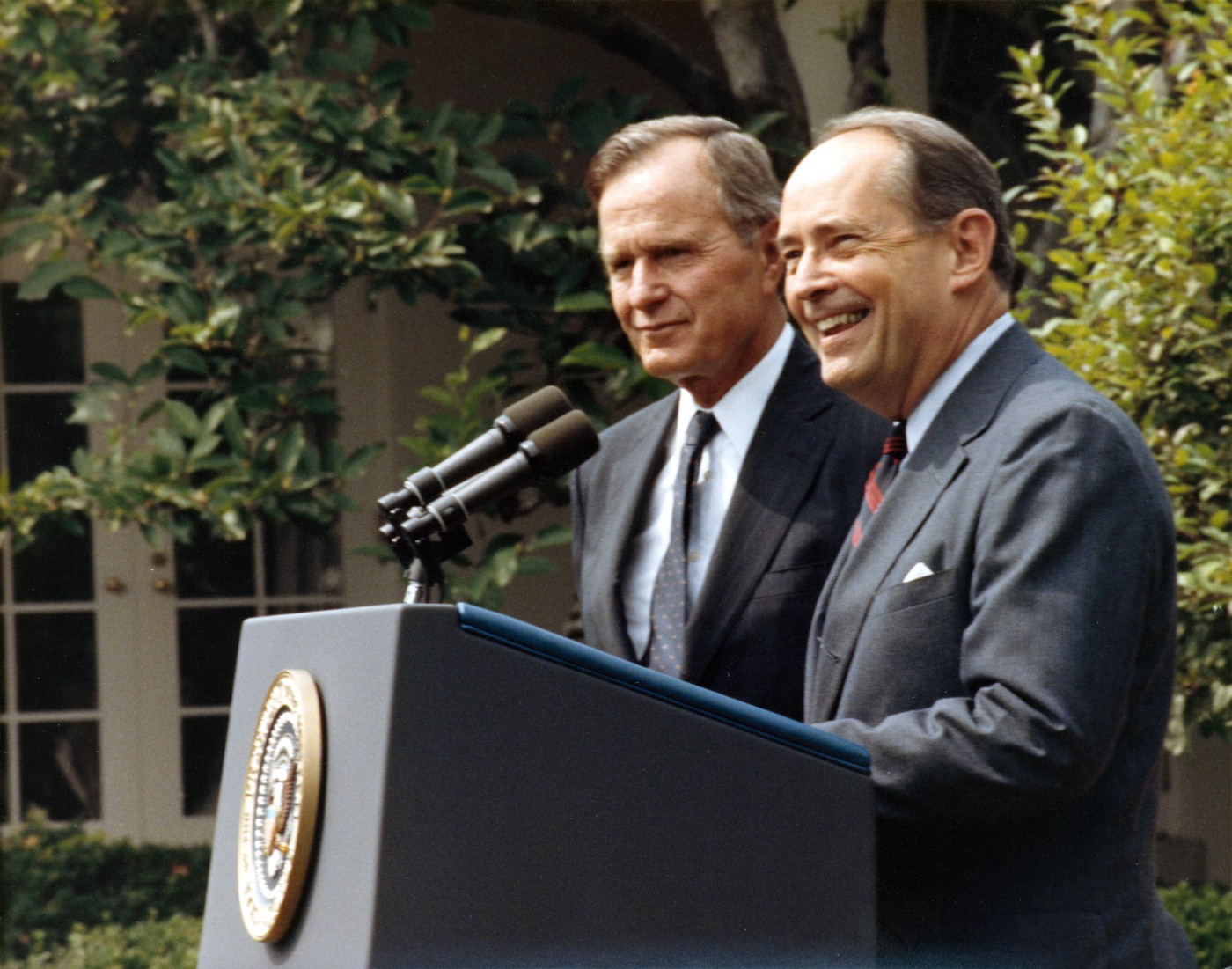
President George Bush joins Attorney General Dick Thornbugh at the podium in the White House garden on September 12, 1990.
Photo: Dick Thornburgh Photograph Collection
Disability and the prophet’s call
Editor’s note: Dick Thornburgh, former Pennsylvania governor and U.S. attorney general, died December 31, 2020. A public service celebrating his life, postponed due to the pandemic, will take place Sunday, October 16, 2022, in Pittsburgh. The following is a 2017 article he wrote for The Christian Citizen. We are republishing it in celebration of his life; commitment to the rule of law; service to his community, state, and nation; and devotion to his family.
Those of us in public life often identify ourselves with Micah 6:8, where we are admonished “to do justice, and to love kindness, and to walk humbly with your God.” I am no exception. Rather than simply restating this timeless instruction, let me try to put it in the context of the particular challenges and opportunities of my own life.
First is the call “to do justice.” This duty might be considered almost instinctive for a lawyer — nearly second nature — by virtue of our training and our experience. Yet this responsibility clearly extends beyond the courtroom and boardroom. For me, it begins in the family with my wife and four sons, where fairness and just treatment are absolute musts for a productive and loving home environment. It extends into the community, where, throughout my career, I have tried to uphold “EQUAL JUSTICE UNDER LAW,” as emblazoned on the façade of the U.S. Supreme Court, by providing legal aid to those who couldn’t afford a lawyer. As a prosecutor and as a governor, I tried to make a good-faith effort to combine the toughness necessary to maintain public order with a compassion that took into account the distress of people in real need.
The second instruction, “to love kindness” — or, as in the King James Version, “to love mercy” — is an admonition that encompasses the highest claim on those in public life — assisting others. First and foremost, it requires listening to others and identifying their needs — listening with the heart as well as the head. This obligation led me to a leadership role in securing passage of the American with Disabilities Act (ADA) in 1990. The act secured and advanced the rights of 54 million Americans with physical, sensory, psychiatric and intellectual disabilities by guaranteeing entry into the mainstream of American life. This opportunity had special meaning for me.
In 1960, our family suffered a terrible loss. My first wife was killed in an automobile accident while driving our three sons home after taking me to work. Our infant son, 4-month-old Peter, was seriously injured with multiple skull fractures and extensive brain injuries that left him with intellectual disability. After three years as a single parent, God sent Ginny Judson, a schoolteacher from Boston, who married me, became a mom to my boys and, later, added a fourth son. Ginny became an advocate for Peter, and then for all Pennsylvanians with intellectual disability, and eventually for persons with all kinds of disabilities around the world.
The final instruction of Micah 6:8 is “to walk humbly with your God.” This is a difficult challenge to fulfill. Humility requires first turning ourselves over to God when facing decisions about careers, goals and ambitions. We can never act as if we, alone, have the wisdom and insight to provide the right responses to life’s varied challenges. It also means acknowledging when we are wrong — to the public, to be sure, but to family, friends and colleagues as well.
These tasks are especially difficult for those of us in public life. Whether elected or appointed, we are regularly tempted to try to create an aura of perfection and infallibility about ourselves, not only to ensure that we are maintained in office, but also to accomplish our well-intended goals. During all my challenges, I’ve never hesitated to turn to God in prayer, not to achieve a particular result, win an election or to derive a quick answer to a knotty problem, but for the strength, wisdom, and patience to deal with the varied problems of life. Those prayers have always been answered.
And my infant son who was so seriously injured in that accident? Peter lives semi-independently in a supervised apartment in Harrisburg, Pennsylvania.[i] He works most days as a volunteer at a food bank. He has brought great joy into the lives of his family, his friends and colleagues, and the United Methodist congregation with whom he worships regularly. Peter’s impact on our family, as you can imagine, has been profound. Peter slows us down. Peter forces us to think about essentials. He’s not impressed by the books I’ve read, how often I’m on TV, or how quickly I can do The New York Times Crossword Puzzle. He possesses a quiet dignity that serves as an inspiration to all who know him. His own values are very much in order. Once, when visiting with us, he and I went to the Washington Zoo. We saw all the animals and laughed together at the antics of many of them. At the end of our excursion, I asked him what he’d liked best about our experience, expecting a reply related to the animals we had seen. Instead, he responded quite simply, “Being with you.” Walk humbly with my God, indeed. What a transcendent message my son shared with me that day!
The views expressed are those of the author and not necessarily those of American Baptist Home Mission Societies.


